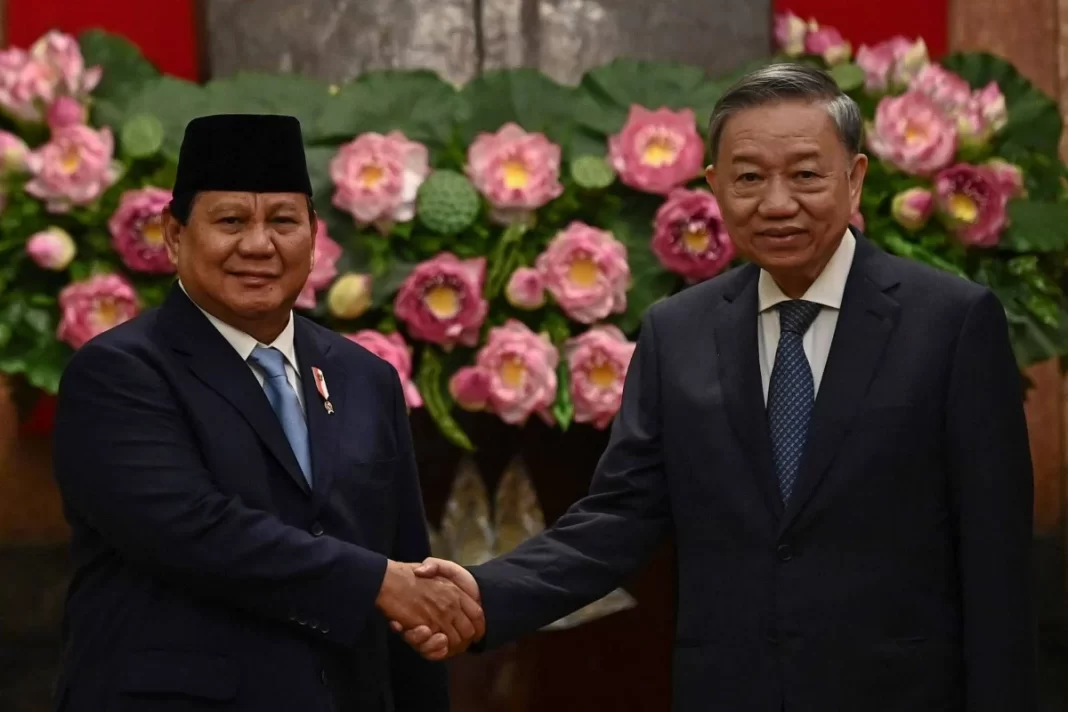Vietnam continues to expand its diplomatic network by elevating ties with Indonesia. This move reflects Vietnam’s broader strategy of maintaining neutrality and building strong relations with multiple nations. By doing so, Vietnam ensures that it stays non-aligned and can navigate its position between major powers like China and the United States.
Vietnam’s Diplomatic Strategy: “Enemy to None”
According to analysts, Vietnam’s approach to foreign relations centers around the idea of being “an enemy to none.” This strategy allows the country to avoid becoming entangled in the growing tensions between China and the United States. Instead, Vietnam seeks to maintain a balanced foreign policy, strengthening ties with various countries without causing alarm.
During a recent visit to Vietnam, Indonesian President-elect Prabowo Subianto announced that both nations had agreed to elevate their relations to a Comprehensive Strategic Partnership (CSP). The official upgrade will take place next year, marking the 70th anniversary of their diplomatic relations. Indonesia will be the first ASEAN country to hold a CSP status with Vietnam.
Why CSP Matters for Vietnam
Vietnam’s expanding list of CSPs with countries like China, Russia, and the U.S. demonstrates its desire to broaden its diplomatic options. As Vietnam establishes more partnerships, it gains flexibility in dealing with major powers. This allows it to balance its relations between the U.S. and China, showing neither side favoritism.
Abdul Rahman Yaacob, a research fellow at the Lowy Institute, says that Vietnam’s CSPs give it more room to maneuver. “The more diplomatic choices Hanoi has, the better, as this will provide a counterbalance to Vietnam’s relations with the major powers,” he explained.
Careful Diplomacy: Keeping China in Mind
Vietnam’s relationships with ASEAN countries like Indonesia and Singapore will likely focus more on economic and cultural cooperation rather than defense or security. This approach is a deliberate one to avoid alarming China, a close neighbor and significant trading partner.
Observers believe that Vietnam’s partnerships with other ASEAN nations will prioritize trade and investment over security matters. For example, Vietnam’s potential upgrade to a CSP with Singapore would enhance economic ties. Singapore is currently Vietnam’s largest foreign investor, accounting for 18% of foreign direct investment in 2023.
Vietnam and Singapore: A Growing Partnership
Singapore has long been a significant economic partner for Vietnam. More than 3,000 Singaporean companies have invested in Vietnam, covering industries like manufacturing, real estate, and retail. In 2023, Singapore’s investment in Vietnam totaled $6.9 billion.
Bich Tran, a fellow at the Lee Kuan Yew School of Public Policy, noted that Vietnam’s relationship with Singapore is even stronger than with Indonesia. Both countries share a “similar strategic outlook” of developing broad networks of friends while staying neutral in global politics.
Relations with the Philippines and Other ASEAN Nations
Vietnam’s focus on CSPs extends beyond Indonesia and Singapore. In 2023, Vietnam and the Philippines agreed to advance their defense and military cooperation, particularly in the South China Sea, where both nations have disputes with China. However, trade relations between the two countries still have room for improvement.
Vietnam and the Philippines have a trade turnover of $7.1 billion, and the Philippines ranks as Vietnam’s 16th-largest trading partner globally. Though defense ties are strengthening, further collaboration in trade and investment may be needed to deepen the partnership.
Vietnam’s Balancing Act
Vietnam’s strategy of building multiple CSPs with countries in ASEAN and beyond gives it diplomatic flexibility and ensures it remains non-aligned in global politics. By strengthening ties with its neighbours like Indonesia and Singapore, Vietnam is positioning itself as a regional leader while avoiding taking sides in the U.S.-China rivalry.

